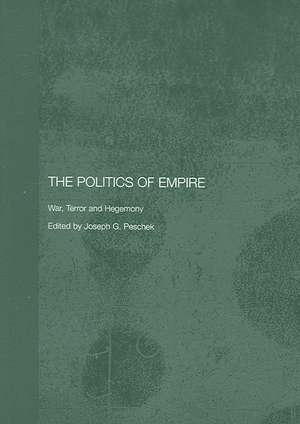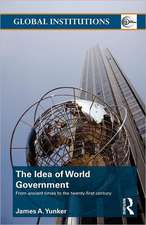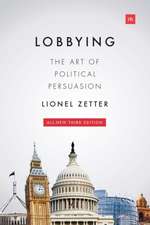The Politics of Empire: War, Terror and Hegemony
Editat de Joseph Pescheken Limba Engleză Paperback – 8 sep 2005
This is a Special Issue of the Journal New Political Science
Preț: 272.02 lei
Preț vechi: 365.81 lei
-26% Nou
Puncte Express: 408
Preț estimativ în valută:
52.06€ • 54.15$ • 43.63£
52.06€ • 54.15$ • 43.63£
Carte tipărită la comandă
Livrare economică 13-27 martie
Preluare comenzi: 021 569.72.76
Specificații
ISBN-13: 9780415376280
ISBN-10: 0415376289
Pagini: 216
Dimensiuni: 156 x 234 x 17 mm
Greutate: 0.43 kg
Ediția:1
Editura: Taylor & Francis
Colecția Routledge
Locul publicării:Oxford, United Kingdom
ISBN-10: 0415376289
Pagini: 216
Dimensiuni: 156 x 234 x 17 mm
Greutate: 0.43 kg
Ediția:1
Editura: Taylor & Francis
Colecția Routledge
Locul publicării:Oxford, United Kingdom
Cuprins
Introduction
Joseph G. Peschek, Hamline University
US Grand Strategy and Its Contradictions
Carl Boggs, National University, Los Angeles
Pretexts and U.S. Foreign Policy: The War on Terrorism in Historical Perspective
David N. Gibbs, University of Arizona
Neoliberalism By Other Means: The War on Terror At Home and Abroad
Gordon Lafer, University of Oregon
War Without End: The Domestic Economic Fallout of Empire
Sheila D. Collins, William Paterson University
We Don’t Torture People in America: Coercive Interrogation in the Global Village
Edward Greer,
Minority Report on the Bush Doctrine
Gerard Huiskamp
Preemptive Strikes and the War on Iraq: A Critique of Bush Administration Unilateralism and Militarism
Douglas Kellner
What to Expect From U.S. Democracy Promotion in Iraq
William I. Robinson
Consensual Deception and US Policy in Iraq
Irene Gendzier
Joseph G. Peschek, Hamline University
US Grand Strategy and Its Contradictions
Carl Boggs, National University, Los Angeles
Pretexts and U.S. Foreign Policy: The War on Terrorism in Historical Perspective
David N. Gibbs, University of Arizona
Neoliberalism By Other Means: The War on Terror At Home and Abroad
Gordon Lafer, University of Oregon
War Without End: The Domestic Economic Fallout of Empire
Sheila D. Collins, William Paterson University
We Don’t Torture People in America: Coercive Interrogation in the Global Village
Edward Greer,
Minority Report on the Bush Doctrine
Gerard Huiskamp
Preemptive Strikes and the War on Iraq: A Critique of Bush Administration Unilateralism and Militarism
Douglas Kellner
What to Expect From U.S. Democracy Promotion in Iraq
William I. Robinson
Consensual Deception and US Policy in Iraq
Irene Gendzier
Descriere
Many questions are raised by the trajectory of U.S. policy under George W. Bush. This Special Issue of the Journal New Political Science critically examines urgent political and analytical questions such as 'what are the political, ideological, and economic roots of the turn in U.S. foreign policy under George W. Bush?'















